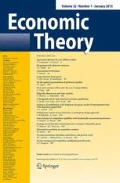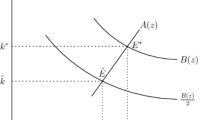Abstract
This paper, which builds on Chipman (The economist’s vision. Essays in modern economic perspectives, 131–162, 1998), analyzes a simple model formulated by Hurwicz (Jpn World Econ 7:49–74, 1995) of two agents—a polluter and a pollutee—and two commodities: “money” (standing for an exchangeable private good desired by both agents) and “pollution” (a public commodity desired by the polluter but undesired by the pollutee). There is also a government that issues legal rights to the two agents to emit a certain amount of pollution, which can be bought and sold with money. It is assumed that both agents act as price-takers in the market for pollution rights, so that competitive equilibrium is possible. The “Coase theorem” (so-called by Stigler (The theory of price, 1966) asserts that the equilibrium amount of pollution is independent of the allocation of pollution rights. A sufficient condition for this was (in another context) obtained by Edgeworth (Giorn Econ 2:233–245, 1891), namely that preferences of the two agents be “parallel” in the money commodity, whose marginal utility is constant. Hurwicz (Jpn World Econ 7:49–74, 1995) argued that this parallelism is also necessary. This paper, which provides an exposition of the problem, raises some questions about this result and provides an alternative necessary and sufficient condition.
Similar content being viewed by others
References
Asheim, G.B., Mitra, T., Tungodden, B.: Sustainable recursive social welfare functions. Econ Theory (2011)
Auspitz R., Lieben R.: Untersuchungen über die Theorie des Preises. Verlag von Duncker & Humblot, Leipzig (1889)
Berry A.: Alcune breve parole sulla teoria del baratto di A. Marshall. Giorn Econ Series 2 2, 549–553 (1891)
Boulding K.E.: The concept of economic surplus. Am Econ Rev 35, 851–869 (1945)
Burniaux, J.-M., Martins, J.O.: Carbon leakage: a general equilibrium view. Econ Theory (2011)
Chichilnisky, G.: Sustainable markets with short sales. Econ Theory (2011)
Chichilnisky G., Heal G.: Who should abate carbon emissions? An international viewpoint. Econ Lett 44, 443–449 (1994)
Chichilnisky, G., Heal, G. (eds): Environmental Markets. Equity and Efficiency. Columbia University Press, New York (2000a)
Chichilnisky, G., Heal, G.: Markets for tradable carbon dioxide emission quotas: principles and practice. 13–45 (2000b)
Chichilnisky, G., Heal, G., Starrett, D.: Equity and efficiency in environmental markets: global trade in carbon dioxide emissions. 46–67 (2000)
Chipman J.S.: Homothetic preferences and aggregation. J Econ Theory 8, 26–38 (1974)
Chipman J.S.: A close look at the Coase theorem. In: Buchanan, J.M., Monissen, B. (eds) The Economists’ Vision. Essays in Modern Economic Perspectives, pp. 131–162. Campus Verlag, Frankfurt am Main (1998)
Chipman J.S.: Aggregation and estimation in the theory of demand. In: Mirowski, P., Hands, D.W (eds) Agreement on Demand: Consumer Theory in the Twentieth Century, pp. 106–129. Duke University Press, Durham and London (2006)
Chipman J.S., Moore J.C.: The scope of consumer’s surplus arguments. In: Tang, A.M., Westfield, F.M., Worley, J.S. (eds) Evolution Welfare, and Time in Economics, Essays in Honor of Nicholas Georgescu-Roegen, pp. 61–123. D. C. Heath and Company, Lexington (1976)
Chipman J.S., Moore J.C.: Compensating variation, consumer’s surplus, and welfare. Am Econ Rev 70, 933–949 (1980)
Coase, R.H.: The problem of social cost. J Law Econ 3, 1–44 (1960). Reprinted in Coase (1988), 95–156.
Coase R.H.: The Firm, the Market, and the Law. The University of Chicago Press, Chicago (1988)
Dutta, P.K., Radner, R.: Capital Growth in a global warming model: will China and India sign a cliimate treaty? Econ Theory (2011)
Edgeworth F.Y.: Mathematical Psychics. C. Kegan Paul & Co., London (1881)
Edgeworth, F.Y.: Osservazioni sulla teoria matematica dell’economia politica con riguardo speciale ai principi di economia di Alfredo Marshall; and Ancora a proposito della teoria del baratto. Giorn Econ Series 2, 2, 233–245, 316–318 (1891). Abridged, revised, and corrected English translation in Edgeworth (1925)
Edgeworth, F.Y.: On the determinateness of economic equilibrium. In: Papers Relating to Political Economy, 3 vols. London: Macmillan and Co., Limited, vol. II, 313–319 (1925)
Figuières, C., Tidball, M.: Sustainable exploitation of a natural resource: a satisfying use of Chichilnisky criterion. Econ Theory (2011)
Hurwicz L.: What is the Coase Theorem?. Jpn World Econ 7, 49–74 (1995)
Karp, L., Zhang, J.: Taxes versus quantities for a stock pollutant with endogenous abatement costs and asymmetric information. Econ Theory (2011)
Katzner, D.W.: Static Demand Theory. 49–74 New York: The Macmillan Company (1970)
Laffont J.-J., Martimort D.: The Theory of Incentives: The Principal-Agent Model. Princeton University Press, Princeton and Oxford (2002)
Lange O.: The foundations of welfare economics. Econometrica 10, 215–228 (1942)
Lauwers, L.: Intergenerational equity, efficiency, and constructability. Econ Theory (2011)
Lecocq, F., Hourcade, J.-C.: Unspoken ethical issues in the climate affair. Insights from a theoretical analysis of negotiation mandates. Econ Theory (2011)
Marshall, A.: Principles of Economics, 2nd edn. London: Macmillan and Co. (1891). 9th (variorum) edn, 2 vols., London: Macmillan and Co. Ltd. (1961)
Ostrom, E.: Nested externalities and polycentric institutions: must we wait fro global solutions to climate change before taking action at other scales? Econ Theory (2011)
Pareto, V.: Considerazioni sui principii fondamentali dell’economia politica pura. Giorn Econ, Series 2, 4, 485–512, 5, 119–157 (1892)
Polyanin A.D., Zaitsev V.F., Moussiaux A.: Handbook of First Order Partial Differential Equations. Taylor & Francis, London (2002)
Rezai, A., Foley, D.K., Taylor, L.: Global warming and economic externalities. Econ Theory (2011)
Samuelson P.A.: Constancy of the marginal utility of income. In: Lange, O., McIntyre, F., Yntema, T.O. (eds) Studies in Mathematical Economics and Econometrics, In Memory of Henry Schultz, pp. 75–91. The University of Chicago Press, Chicago (1942)
Samuelson P.A.: The pure theory of public expenditure. Rev Econ Stat 36, 387–389 (1954)
Samuelson P.A.: Diagrammatic exposition of a theory of public expenditure. Rev Econ Stat 37, 350–356 (1955)
Samuelson P.A.: Principles of efficiency—discussion. Am Econ Rev, Papers and Proceedings 54, 93–96 (1964)
Samuelson, P.A.: The pure theory of public expenditure and taxation. In: Margolis, J., Guitton, H. (eds.) Public Economics. London: The Macmillan Press Ltd. and New York: St. Martin’s Press, 98–123 (1969)
Sheeran K.A.: Who should abate carbon emissions? A note. Environ Resour Econ 35, 89–98 (2006)
Stigler G.J.: The Theory of Price. 3rd ed. Collier-Macmillan Limited, London (1966)
Tian G., Yang L.: Theory of negative consumption externalities with applications to economics of happiness. Econ Theory 39, 399–424 (2009)
Author information
Authors and Affiliations
Corresponding author
Additional information
This paper is dedicated to the memory of our esteemed respective former colleague and former thesis advisor Leonid Hurwicz. We greatly regret not having been able to discuss the final section with him before his death. Thanks are due to Augustine Mok for his help with the diagrams.
Rights and permissions
About this article
Cite this article
Chipman, J.S., Tian, G. Detrimental externalities, pollution rights, and the “Coase theorem”. Econ Theory 49, 309–327 (2012). https://doi.org/10.1007/s00199-011-0602-1
Received:
Accepted:
Published:
Issue Date:
DOI: https://doi.org/10.1007/s00199-011-0602-1




